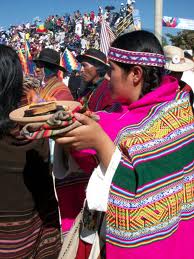Pachamama o muerte! (Mother Earth or Death)
Evo’s rallying cry at the beginning and end of his speech confirmed everything that I’d hoped to find in Bolivia. Here is a leader who really understands the stakes of the epic struggle that we face in climate change and articulates that struggle to potent revolutionary traditions. Before coming on stage, Evo sang the Bolivian national anthem, which ends in an assertion of loyalty to the nation something along the lines of patria o muerte. So, when Evo says pachamama o muerte (Mother Nature or Death), he’s linking the struggle for climate justice to Bolivarian traditions of battle against Spanish colonialism and U.S. imperialism.
It’s one thing to understand the stakes and science of climate change in a relatively dry analytical way. This is obviously an important issue, one that Bill McKibben and Jim Hansen both commented on in their panel today on the politics of climate science. The climate change denialists continue to gain ridiculous amounts of traction through their control of the media and their ability to play on people’s fears of the federal government in the U.S. So we nee to read Hansen and McKibben and understand their explanations of the science as well as their well thought-out calls for radical shifts in contemporary U.S. culture in order to avert climate chaos.
But such calls pale in comparison with the resonant anti-imperialist, anti-capitalist stance of Evo. And this is the kind of leadership we need now. All day I was thinking about what it means to be in this present moment in history. Being here at the conference certainly makes one feel aware of participating in a truly epochal moment. Some people I’ve talked to here have referred to it as “our Woodstock,” perhaps because of the rock concert quality of the inaugural ceremony. But I would compare it much more to the so-called greatest generation, the men and women who fought against fascism and Nazism in the 1930s and 1940s, or to anti-colonial nationalist militants in the decades that followed. These people truly remade world history.But today, we face a struggle that goes way beyond those great battles for liberation — we’re literally fighting for the survival of the human species, and of most other species on the planet as well. I don’t think the gravity of this challenge, as well as the intoxicating sense of mobilization and possibility that come with such world-defining moments, have sunk in with most people yet. But this conference is a blast from the future, a clarion call to make the world anew.
With the World People’s Conference on Climate Change, Evo has occupied the high moral and political ground, and he’s standing there alone. Just to hear him talk through the climate science honestly in his speech and urge the adoption of measures to reduce atmospheric carbon concentrations to 350ppm is to hear words that virtually no other world leader is willing to pronounce. Certainly not Obama, and not even any of the other progressive leaders of Latin America such as Lula or Chavez. In addition, Evo has very cannily created a virtually bulletproof set of alliances for himself with social movements from other parts of the world. It’s going to be very hard to marginalize or even depose him given the alliances gestated at this conference.
Not that Evo doesn’t have feet of clay. His homophobic reference in his speech to GMO chicken leading to effeminancy among men suggested that he’s not in touch with progressives working on gender and sexual orientation issues domestically or internationally. In addition, apparently during the meetings to celebrate the 10th anniversary of the water wars that preceded the conference, many Bolivian activists criticized him for not developing a real environmental agenda for Bolivia. For example, he continues to rely on natural gas exports to Brazil to produce significant revenues for the country rather than shifting to renewable energy. Perhaps there’s an element of hypocrisy then in his strident call to save pachamama, but it’s also true that he needs to maintaining regional alliances, including those with Brazil, the regional super-power where most of Bolivia’s gas goes. But obviously the social movements within Bolivia need to keep the pressure on him for progressive change.
And it is these social movements that give one real hope. There’s an amazing alliance of indigenous leaders, leftists, women’s groups, etc. evident here on the ground. This alliance is leading to fascinating cross-fertilization and transformation. And now the international social movements fighting for climate justice are tapping into and helping build these movements.
The world is being made anew. Pachamama o muerte!


